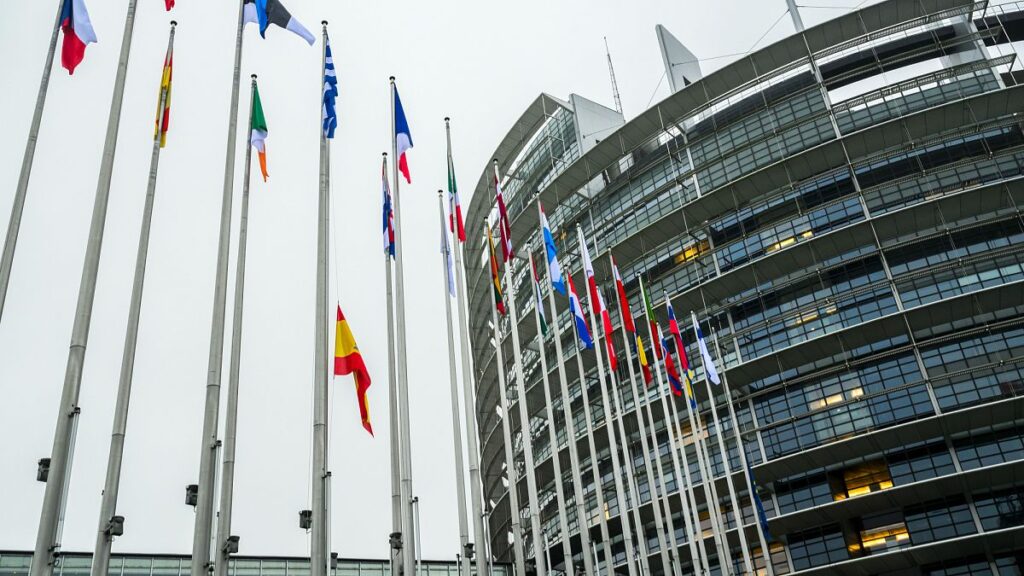Recent scandals have put the spotlight on MEPs’ transparency, even though they already follow a strict code of conduct, updated in 2023, to prevent conflicts of interest — what’s in it, and how does it compare with the norm in other EU countries?
A fresh corruption probe linked to Chinese tech company Huawei, the findings of the French court debarring Marine Le Pen for embezzlement, and a Hungarian proposal to subject MEPs to disclosure obligations akin to their domestic counterparts. This string of recent headlines has put transparency and ethics affecting MEPs under the spotlight.
But here’s the twist: MEPs must follow a Code of Conduct packed with rules on transparency and lobbying ethics. So, what’s in it? And how does it compare to the norm in other EU countries?
Think of the Code of Conduct as the Parliament’s rulebook. First introduced in 2012 and refreshed in 2023, it’s designed to keep MEPs in check, ensuring they act with integrity, transparency, and honesty—all while safeguarding the institution’s reputation.
At its core, the Code is built on the principle that public service must be free from conflicts of interest, whether financial or familial. To uphold this, MEPs must keep their personal and professional interests separate and declare their private interests, assets, and any potential conflicts of interest.
For example, following the scandal in the European Parliament related to Qatari officials, MEPs must now declare any outside activities earnings that exceed €5,000 in a calendar year. But unlike in other countries, EU rules allow MEPs to have outside jobs, which has previously drawn criticism from NGOs and civil society organisations.
To further guarantee transparency, MEPs must also publish records of their meetings with lobbyists and officials from within or outside the EU, as well as any trips or events where their travel, accommodation, or other expenses are covered by third parties. This information is publicly available on their profile—except for their asset declarations, which remain private.
If an MEP receives a gift worth more than €150 while on official duties, it must be declared and recorded in a public register, which you can check for yourself if you’re curious about what’s in the Parliament’s treasure room.
Of course, rules mean little without enforcement. MEPs who break the code could face sanctions from the President of the European Parliament — currently Roberta Metsola — which would then be publicly announced in a plenary session.
However, these rules vary at national level and members of different parliaments have their own set of rules on transparency, lobbying, and conflicts of interest. Euronews has looked at the situation in Hungary, Spain, Italy, France, and Germany. Here’s a summary:
Hungarian draft law targets MEPs
Last month, Hungary’s ruling Fidesz-KDNP party proposed a new law that could subject MEPs to similar transparency rules as their domestic counterparts. This would mean a declaration of assets at the beginning and end of the mandate, and in between every year in January.
The declarations would extend beyond the MEP to include family members living in the same household, but while the former would be public, the latter would not have to be.
Such declarations must include property and vehicles, investments, any income or regular remuneration, and any position in a company or public, not-for-profit organisation.
The new draft law also stipulates that MEPs failing to comply with the new transparency disclosures could see their mandates revoked by the National Elections Office (NEO), and threatens to target opposition leader Péter Magyar, he claimed.
Spain’s rules for lobbyists aren’t really working
In Spain, for example, there is no register of lobbyists as exists on the European level, but both deputies and senators are obliged to publish their institutional agenda, including meetings with so-called “interest representatives”.
In practice, however, this ban does not prevent lobbyists from organising their meetings with MPs without leaving any trace, according to a recent report by the Spanish Parliament’s Conflict of Interest Office.
As regards gifts, the rules are very similar to those followed by MEPs in Brussels. Both MEPs and senators cannot accept gifts that could be seen as an attempt to influence their decisions. If the value exceeds €150, they should not accept it, unless it is a personal gift from friends or family or on a general discount available to everyone. If they receive gifts at official events, they must hand them over to the Chamber so that they can be recorded and published on the website.
Members must also declare what professional activities they have carried out in the last five years and whether they have received any donations, gifts, or financial assistance that could influence their work. They also have to declare if they have worked with foundations or associations.
All this information must be published on the website of the Congress or Senate so that any citizen can consult it in a clear and accessible way.
Italy’s code of conduct for MPs is not binding
In theory, Italian MPs and senators have two sets of rules to follow: codes of conduct introduced in 2016 for the Chamber of Deputies and in 2022 for the Senate – but what do they entail?
Both deputies and senators are required to submit a declaration of assets, including tax returns, property, and campaign expenses, within three months of being elected. MPs have an extra step, as they must also declare any roles they have held in private or public companies within 30 days of their election. All this is published online for the public to see.
When it comes to gifts, things get interesting. The Chamber of Deputies has a clear rule: no gifts worth more than €250. If their travel, accommodation, or meals are paid for by someone else – an event organiser, for example – this must also be made public.
The Senate, however, is much more permissive. Instead of setting a limit, senators are simply asked to make sure that any gifts they accept are in line with ‘customs of courtesy’, which sounds vague enough to leave plenty of wiggle room.
But here’s the real kicker. The Senate’s code is binding, while that of the Lower House isn’t, making it more of a set of suggestions than actual rules.
France instituted an independent watchdog in 2013
Since 2013, France has been stepping up its oversight of political activities with the creation of the High Authority for the Transparency of Public Life (Haute Autorité pour la Transparence de la Vie Publique, HATVP). This independent watchdog was designed to keep an eye on elected officials, but according to Le Monde, it mostly focuses on financial misconduct and expense control, while ethical concerns often fly under the radar.
In 2017, Emmanuel Macron’s government introduced a bill to “restore confidence in public life”, expanding the HATVP’s role. New responsibilities included monitoring family employment and requiring presidential candidates to declare not just their assets but also their interests.
A few years later, in 2019, another law handed over additional duties to the HATVP, taking over functions previously managed by the Commission de Déontologie de la Fonction Publique.
Today, the declarations of interests and activities of deputies, senators, and members of the European Parliament are publicly available on the High Authority’s website. For French MEPs, asset declarations have been included since 2019.
Failing to declare, omissions or false declarations expose politicians to liability for up to three years’ imprisonment and a €45,000 penalty.
Germany introduced its own transparency register
Since 2021, Germany has significantly tightened transparency and ethics rules for Bundestag members with a Transparency Act, requiring them to declare any interests they represent.
Today, MPs must report company ownership stakes of more than 5%, a major shift from the previous 25% threshold. Bribery laws have also been toughened, with penalties now ranging from one to ten years in prison.
To prevent conflicts of interest, Bundestag members cannot accept money or benefits beyond their official salary—especially if it’s given in expectation of political favours. They also cannot receive payments without providing a legitimate service in return, though donations remain allowed.
MPs must disclose their past and current side jobs, including consultancy, lobbying, writing, or lecturing—unless these activities earn less than €1,000 per month or €10,000 per year.
Failing to report required information can result in fines of up to half a year’s salary.
Premium IPTV Experience with line4k
Experience the ultimate entertainment with our premium IPTV service. Watch your favorite channels, movies, and sports events in stunning 4K quality. Enjoy seamless streaming with zero buffering and access to over 10,000+ channels worldwide.

















